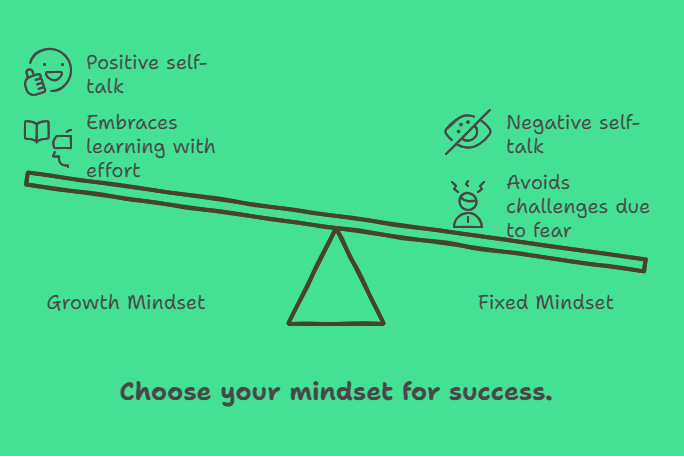Imagine trying to climb a mountain while telling yourself, “I can’t do this.” Doesn’t work, right? That’s because your mindset is the fuel—or the flat tire—on your journey. The idea that you can improve, even if you’re not there yet, is a game-changer. Whether you’re learning a new skill, recovering from a setback, or simply trying to become a better version of yourself, belief is the spark that lights the fire.
In this article, we’ll dive deep into the power of believing that you can improve, exploring the psychology behind it, real-life examples, and practical tips for building a belief system that propels you forward. Get ready to shift your thinking and maybe, just maybe, change your life.
What Does It Mean to Believe in Improvement?
We all want to improve in life. But the question is—do we truly believe that improvement is possible? This belief shapes our learning style, our work ethic, and our potential for success. Let’s explore how this mindset influences our attitude and our future.

Growth Mindset vs Fixed Mindset
Let’s break it down. Psychologist Carol Dweck coined the idea of a growth mindset—the belief that intelligence and abilities can be cultivated over time. Its opposite? A fixed mindset, which assumes your skills are set in stone.
People with a growth mindset say, “I can learn this with effort.” Fixed mindset folks say, “I’m just not good at this.” Which one do you think gets ahead?
It Starts with Self-Talk
Your inner voice has the power to be your greatest supporter or your harshest judge. Saying “I’ll never be good at this” is like slamming the door before you even try. But saying “I can improve if I work at it” opens that door wide.
Start noticing your thoughts—are they lifting you up or pulling you down?
Why Belief Is the First Step to Change
Everything starts with a belief—that I can, that I can change. This belief is the seed of transformation. No matter how much planning you do, if you’re filled with self-doubt, it becomes difficult to move forward. Let’s explore why belief is the first step toward any positive change.
Belief as the Foundation for Progress
Think of belief as the soil where success grows. Without belief, no matter how many tools or opportunities you have, nothing sticks. Believing in your ability to improve sets the tone for action.
It’s not about arrogance. It’s about giving yourself permission to try—and fail—and try again.
The Science Behind Belief and Motivation
When you believe in improvement, your brain literally works differently. Dopamine (the feel-good chemical) spikes when you think progress is possible. Your motivation gets a boost, and suddenly, that impossible goal feels a bit more doable.
It’s brain chemistry, not just pep talk.
The Power of Believing That You Can Improve in Real Life
The power of believing that you can improve”—this belief is often the starting point of real-life transformation. When you think, “I can do better,” the path to learning, growth, and recovery opens up. Let’s explore how this mindset reshapes our approach to learning, performance, and even failure.

Academic Growth Through Belief
Ever bombed a test and thought, “I’m just not smart enough”? That’s a fixed mindset speaking. Believing you can learn and get better turns that failure into feedback. You study smarter, ask for help, and bounce back.
The students who succeed aren’t always the most naturally gifted—they’re the ones who believe improvement is possible.
Sports and Skills: Belief Fuels Performance
Ask any athlete. Confidence and belief can make or break performance. Michael Jordan was cut from his high school basketball team. He didn’t quit—he trained like crazy because he believed he could get better.
You don’t need to be Jordan. But a little self-belief can turn a hobby into a strength.
Overcoming Failure with the Right Mindset
Failure feels terrible. But when you believe that you can improve, failure becomes a lesson—not a label. You stop fearing mistakes and start learning from them.
It’s like falling off a bike. You don’t say, “I’m just bad at biking.” You get back on.
How to Cultivate the Belief That You Can Improve
We can all improve—we just need to believe it. Small changes in habits and mindset can transform our entire lives. Let’s explore how to build that belief.
Practice Positive Affirmations
Say it out loud: “I can learn anything I set my mind to.” It might feel silly at first, but affirmations work like mental push-ups. The more you repeat them, the stronger your belief in them becomes.
Write them on sticky notes. Set them as your phone wallpaper. Repeat until they become second nature.
Learn from Role Models Who Grew
Look at people who’ve achieved what you want to do. Chances are, they started exactly where you are—or even further behind. Read their stories. Watch their interviews.
Real-life proof makes your own belief more believable.
Reflect on Your Past Wins
Think back. Have you ever improved at something before? Maybe you went from failing math to acing a test. Or from a nervous speaker to a confident presenter.
Keep telling yourself: “If I was able to do it before, I can do it again.
The Psychology Behind Belief in Self-Improvement
The belief in self-improvement isn’t just about confidence—it’s grounded in psychology and science. There’s a real scientific explanation behind how our brains, habits, and reactions work. You develop as you think. And when you believe that learning is possible, the doors to learning begin to open. Let’s explore what psychology has to say about this.
Neuroplasticity and Growth
Your brain isn’t static—it changes! This ability is called neuroplasticity. When you learn, practice, and stretch yourself, your brain rewires.
Believing in improvement isn’t wishful thinking—it’s neuroscience.
The Impact of Praise and Feedback
Ever been told, “You’re so smart”? That might actually backfire. It creates pressure to always be smart instead of getting smarter. But hearing “You worked hard and it paid off” reinforces belief in growth.
The right kind of praise fuels improvement.
All in all of this article
Here’s the truth: believing you can improve is like planting a seed. It won’t grow overnight, but with time, care, and consistency, you’ll see the change. The power of believing that you can improve isn’t just motivational fluff—it’s a real, transformative mindset that reshapes how you learn, live, and lead.
So the next time you think, “I can’t do this,” pause and reframe it. Say instead: “I can’t do this… yet.”
Thank you for reading this article I wrote. If you enjoyed it, please share it on your social media so your friends can read it too.
Frequently Asked Questions (FAQs)
1.What does it mean to believe you can improve?
It means having confidence that with effort, practice, and persistence, you can develop new skills and overcome challenges.
2.Why is belief so important for personal growth?
Belief lays the foundation for motivation, resilience, and action—without it, progress is nearly impossible.
3.What is a growth mindset?
.A belief that abilities can be developed through dedication and hard work.
4.Can belief really change your brain?
Yes, belief activates brain changes through a process called neuroplasticity.
5.How can I start believing in myself?
Use positive affirmations, reflect on past successes, and surround yourself with supportive influences.
6.What’s an example of the power of believing in improvement?
A student improving from failing grades to top scores by changing study habits and mindset.
7.Is failure still bad if I believe I can improve?
No—failure becomes a stepping stone rather than a setback.
8.What role does self-talk play in belief?
Self-talk can reinforce your ability to grow or sabotage it—positive self-talk boosts belief.
9.How do role models help with belief?
They provide proof that improvement is possible, making belief feel more attainable.
10.Can belief alone lead to success?
Belief needs to be paired with effort, but it’s the crucial first step.
11.How does mindset affect learning?
A growth mindset encourages curiosity, persistence, and resilience in learning.
12.How long does it take to build belief in yourself?
It varies—but consistency in habits and thought patterns builds belief over time.

